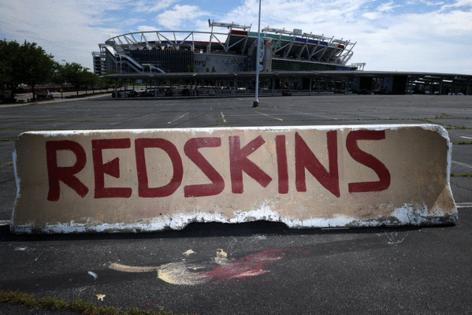Commentary: Cane sugar Coke? Bringing back the Redskins? Trump's little gripes serve a larger purpose
Published in Op Eds
With the Jeffrey Epstein controversy still dogging him, President Donald Trump has embraced his favorite distraction: the culture wars.
It began when he announced that Coca-Cola was switching to cane sugar instead of high-fructose corn syrup. Coke responded with a statement that basically boiled down to: “Wait, what?” — before announcing the company would release a Trump-approved version of the famous cola.
Now, you might think decisions like these should be left up to the companies. After all, it’s none of the government’s business, and Republicans supposedly believe in free markets.
But no! Trump followed up by threatening to block a new stadium for Washington’s NFL team unless it changed its name back to the Redskins. He also demanded that Cleveland’s baseball team go back to being called the Indians.
At first glance, this seems like a ridiculous ploy to distract us from Epstein. And sure, that’s part of the story. But here’s what Trump understands: A lot of Americans feel like somebody came along and stole all their cool stuff — iconic team names, high-hold hair spray, military bases named after Confederate generals — and replaced them with soulless, modern stuff. “Guardians,” “low-flow shower heads,” “Fort Liberty.”
We might laugh at his trivial Coke crusade, but sports teams evoke more primal emotions. You can drink a Coke today and a Pepsi tomorrow. But you can’t root for the Indians on Monday and the Detroit Tigers on Tuesday. Not unless you’re a psychopath — or someone who wants to get punched in a bar. Team loyalty matters.
Trump gets this. When I was a kid, the Redskins won three Super Bowls. There were songs like “Hail to the Redskins,” team heroes (like John Riggins, Doug Williams and coach Joe Gibbs), and all manner of burgundy and gold merch. It wasn’t just a team. It was part of our identity — as well as an excuse to spend time together (even as decades passed without another Super Bowl run).
Then one day: poof. Goodbye Redskins.
Now imagine that same sense of loss in an already deracinated place like the Rust Belt, where the ball club is a big part of the city’s identity, and where they already closed Dad’s factory and then had the gall to take his boyhood team’s name too.
This isn’t really about names. It’s about nostalgia. Tradition. Identity. It’s about trying to keep a tenuous grip on a world you can still recognize, while everything else dissolves into a place where even choosing a bathroom is a political statement.
Now, is the name Redskins offensive? Sure. Even though a 2016 Washington Post poll found that 9 out of 10 Native Americans weren’t offended, you’d be hard-pressed to defend it on the merits. But the Indians? Come on. Just lose the Chief Wahoo cartoon. This isn’t rocket science.
So is Trump onto something when it comes to the real-world backlash to overwrought political correctness? Yes. But he’s also profiting politically off of people pining for a world that never really existed.
I thought about this last fall when Trump worked the fry station and drive-through window at a McDonald’s in Pennsylvania. At first, it seemed like just another stunt to troll Kamala Harris (who said she once worked for McDonald’s).
But then I saw him in that red apron with the yellow piping — still wearing his red tie, of course — and thought: This is Rockwell. This image evokes a time when a white guy of a certain age could sling burgers, go home to his wife and kids, mow his middle-class lawn, crack open a Coca-Cola, and watch the Redskins and the Cowboys.
Whether Trump consciously appreciates the power of this imagery, I don’t know. But he clearly understands that there is power in yearning, that culture is more primordial than American politics and that refusing to exploit these forces (out of some sense of propriety) would be a sucker’s move.
To some degree, he’s been playing this game for years — think energy efficient lightbulbs, paper straws and his criticism over Apple’s decision to get rid of the iPhone home button. If something new comes along, Trump is already up there stoking cultural outrage, blaming the “woke” left and demanding somebody bring him a Diet Coke. It’s what he does.
But here’s why this actually matters: These little skirmishes don’t just distract from the bigger, more dangerous stuff — they enable it.
Even as he accuses former President Barack Obama of treason (which is absurd and dangerous), Trump’s bond with his supporters is reinforced by these small, almost laughable grievances. He makes them feel seen, defended and nostalgic for a world that (to them, at least) made more sense.
That emotional connection with his base is what allows Trump to tell bigger lies and launch bolder attacks without losing them.
Coke and the Redskins may seem trivial. But they’re the sugar that helps the poison go down.
____
Matt K. Lewis is the author of “Filthy Rich Politicians” and “Too Dumb to Fail.”
©2025 Los Angeles Times. Visit at latimes.com. Distributed by Tribune Content Agency, LLC.

























































Comments